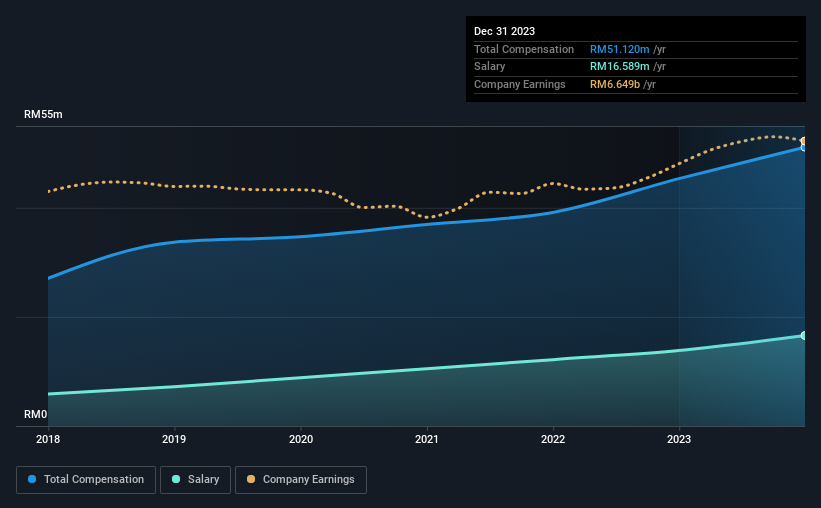Shareholders May Not Be So Generous With Public Bank Berhad's (KLSE:PBBANK) CEO Compensation And Here's Why
Key Insights
Public Bank Berhad will host its Annual General Meeting on 8th of May
CEO Ah Lek Tay's total compensation includes salary of RM16.6m
The overall pay is 2,833% above the industry average
Over the past three years, Public Bank Berhad's EPS grew by 11% and over the past three years, the total shareholder return was 13%
Under the guidance of CEO Ah Lek Tay, Public Bank Berhad (KLSE:PBBANK) has performed reasonably well recently. As shareholders go into the upcoming AGM on 8th of May, CEO compensation will probably not be their focus, but rather the steps management will take to continue the growth momentum. However, some shareholders may still be hesitant of being overly generous with CEO compensation.
Check out our latest analysis for Public Bank Berhad
How Does Total Compensation For Ah Lek Tay Compare With Other Companies In The Industry?
At the time of writing, our data shows that Public Bank Berhad has a market capitalization of RM80b, and reported total annual CEO compensation of RM51m for the year to December 2023. We note that's an increase of 13% above last year. We think total compensation is more important but our data shows that the CEO salary is lower, at RM17m.
For comparison, other companies in the Malaysian Banks industry with market capitalizations above RM38b, reported a median total CEO compensation of RM1.7m. This suggests that Ah Lek Tay is paid more than the median for the industry. What's more, Ah Lek Tay holds RM129m worth of shares in the company in their own name, indicating that they have a lot of skin in the game.
Component | 2023 | 2022 | Proportion (2023) |
Salary | RM17m | RM14m | 32% |
Other | RM35m | RM32m | 68% |
Total Compensation | RM51m | RM45m | 100% |
Speaking on an industry level, nearly 40% of total compensation represents salary, while the remainder of 60% is other remuneration. It's interesting to note that Public Bank Berhad allocates a smaller portion of compensation to salary in comparison to the broader industry. If non-salary compensation dominates total pay, it's an indicator that the executive's salary is tied to company performance.
A Look at Public Bank Berhad's Growth Numbers
Public Bank Berhad's earnings per share (EPS) grew 11% per year over the last three years. In the last year, its revenue changed by just 0.9%.
Shareholders would be glad to know that the company has improved itself over the last few years. It's always a tough situation when revenues are not growing, but ultimately profits are more important. Moving away from current form for a second, it could be important to check this free visual depiction of what analysts expect for the future.
Has Public Bank Berhad Been A Good Investment?
With a total shareholder return of 13% over three years, Public Bank Berhad shareholders would, in general, be reasonably content. But they probably wouldn't be so happy as to think the CEO should be paid more than is normal, for companies around this size.
To Conclude...
Seeing that the company has put up a decent performance, only a few shareholders, if any at all, might have questions about the CEO pay in the upcoming AGM. Still, not all shareholders might be in favor of a pay raise to the CEO, seeing that they are already being paid higher than the industry.
CEO compensation can have a massive impact on performance, but it's just one element. That's why we did some digging and identified 1 warning sign for Public Bank Berhad that you should be aware of before investing.
Switching gears from Public Bank Berhad, if you're hunting for a pristine balance sheet and premium returns, this free list of high return, low debt companies is a great place to look.
Have feedback on this article? Concerned about the content? Get in touch with us directly. Alternatively, email editorial-team (at) simplywallst.com.
This article by Simply Wall St is general in nature. We provide commentary based on historical data and analyst forecasts only using an unbiased methodology and our articles are not intended to be financial advice. It does not constitute a recommendation to buy or sell any stock, and does not take account of your objectives, or your financial situation. We aim to bring you long-term focused analysis driven by fundamental data. Note that our analysis may not factor in the latest price-sensitive company announcements or qualitative material. Simply Wall St has no position in any stocks mentioned.

